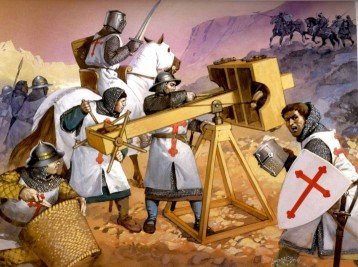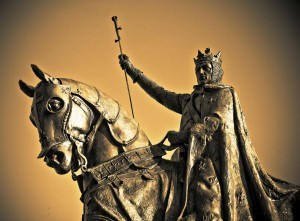Crusading Popes in Defense of the West
Paul Crawford’s essay, “Four Myths about the Crusades” is a wonderful antidote to the received wisdom about the Crusades. According to the standard account,
the crusades are depicted as a deplorably violent episode in which thuggish Westerners trundled off, unprovoked, to murder and pillage peace-loving, sophisticated Muslims, laying down patterns of outrageous oppression that would be repeated throughout subsequent history. In many corners of the Western world today, this view is too commonplace and apparently obvious even to be challenged.
He recounts the long history of Muslim conquest and threats against the West beginning in 632 and extending right up to the First Crusade in 1095. The Popes were key players in the defense of the West.
This is not the absence of provocation; rather, it is a deadly and persistent threat, and one which had to be answered by forceful defense if Christendom were to survive. The crusades were simply one tool in the defensive options exercised by Christians.
To put the question in perspective, one need only consider how many times Christian forces have attacked either Mecca or Medina. The answer, of course, is never.
Crawford also rebuts the allegation that the Crusaders saw their activity as leading to wealth. The reality was that, as always, going to war was very costly. “In short: very few people became rich by crusading, and their numbers were dwarfed by those who were bankrupted. Most medieval people were quite well aware of this, and did not consider crusading a way to improve their financial situations.” Further, the main motivation of the Crusaders was religious idealism–crusading would save their souls: Soldiers were recruited, not drafted, on the basis of sermons whose message
worked because crusading was appealing precisely because it was a known and significant hardship, and because undertaking a crusade with the right motives was understood as an acceptable penance for sin. Far from being a materialistic enterprise, crusading was impractical in worldly terms, but valuable for one’s soul. … Crusading was an act of selfless love.
This religious idealism that was so common in the Middle Ages also motivated a great deal of self-sacrificing behavior by monks and other religious personnel, providing a psychological underpinning to Medieval collectivism, as noted in “What Makes Western Culture Unique“:
The collectivism of Western European society in the late Middle Ages was real. There was intense group identification and group commitment to Christianity among all levels of society, as indicated, for example, by the multitudes of pilgrims and the outpouring of religious fervor and in-group fervor associated with the Crusades to free the Holy Land from Muslim control. The medieval Church had a strong sense of Christian group economic interests vis-à-vis the Jews, and often worked vigorously to exclude Jews from economic and political influence and to prevent social intercourse between Christiansand Jews.
…There were also high levels of reproductive altruism, particularly among the mendicant friars, many other religious personnel, and eventually the secular elite. Reproductive altruism among the secular elite was mainly the result of coercion but there are also cases of voluntary restraint, as in the case of Louis IX of France—St. Louis. St. Louis was not only a paragon of proper Christian sexual behavior. He also had a powerful sense of Christian group economic interests vis-à-vis the Jews and he was heavily involved in the crusades to return the Holy Land to Christian control. Europeans considered themselves part of a Christian in-group arrayed against non-Christian outgroups (particularly Muslims and Jews) who were seen as powerful and threatening enemies. (p. 14)
it was not the crusades that taught Islam to attack and hate Christians. Far from it. Those activities had preceded the crusades by a very long time, and stretch back to the inception of Islam. Rather, it was the West whichtaught Islam to hate the crusades. The irony is rich.







Comments are closed.